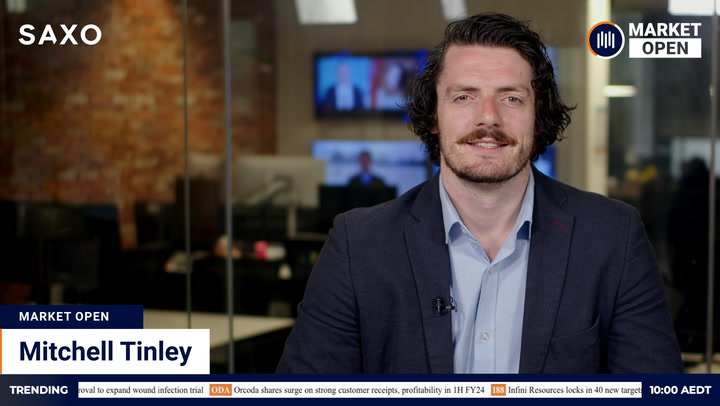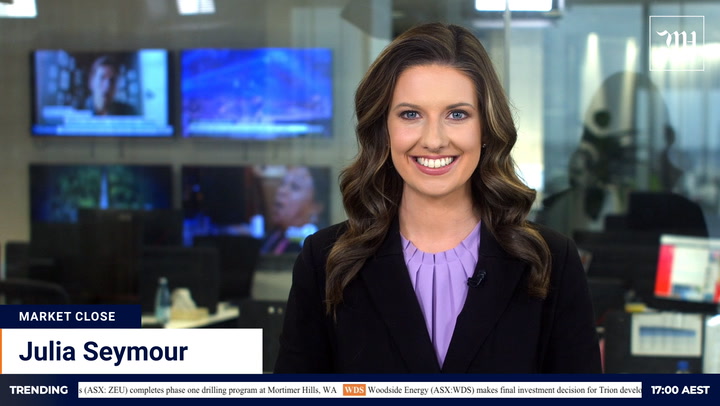A week dominated by central bank and corporate meetings looks set for a strong start after Wall Street shrugged off earnings disappointments from Apple and Amazon.
ASX futures rallied 65 points or 0.89 per cent, signalling a rebound following the local market’s heaviest loss in four weeks. The S&P/ASX 200 dived 1.4 per cent on Friday amid suspicions the Reserve Bank was preparing to tighten monetary policy.
The Federal Reserve, RBA and Bank of England all hold policy meetings this week. The annual general meeting season continues with updates from Qantas, Myer, Z1p Co and Domino’s Pizza.
Wall Street
US stocks finished the month at all-time highs despite post-earnings declines in two of the market’s largest companies. Friday’s gains helped the S&P 500 and Nasdaq Composite seal their best months since November 2020.
The S&P 500 climbed nine points or 0.19 per cent. The Dow Jones Industrial Average gained 89 points or 0.25 per cent. The Nasdaq Composite added 50 points or 0.33 per cent.
Microsoft overtook Apple as world’s most valuable listed company as one tech giant hit a record and the other wilted as supply-chain issues undermined sales. Microsoft rose 2.24 per cent. Apple fell 1.82 per cent after Q3 iPhone revenues came in below expectations.
Amazon.com shares sagged 2.15 per cent after warning the company faced higher costs and weakening demand heading into the holiday season.
The misses from Apple and Amazon were atypical during an otherwise strong Q3 season. More than 80 per cent of S&P 500 companies have surpassed Wall Street earnings estimates.
“I think so far, with about half to the S&P 500 companies having reported, the initial assessment is that profitability has remained fairly resilient because of strong demand and pricing power,” Angelo Kourkafas, investment strategist at Edward Jones, said.
Investors also welcomed signs the White House’s spending plans may not increase corporate taxes as much as originally feared. A revised framework announced on Thursday downgraded both spending and taxes.
“The tax portion of it is looking like it’s going to come in probably below all of the original expectations. So the burden for specifically corporate taxes is going to be lower than the concerns and the expectations in the marketplace were,” Yung-Yu Ma, chief investment strategist at BMO Wealth Management, said.
For the month, the S&P 500 put on 6.9 per cent, the Nasdaq Composite 7.2 per cent and the Dow 5.8 per cent. By contrast, the ASX 200 finished October with back-to-back monthly losses for the first time since the start of the pandemic. The index ended the month with a slender loss of 8.5 points or 0.1 per cent.
Australian outlook
The market appeared to overshoot to the downside on Friday in anticipation of a weak night in the US and as the rates outlook deteriorated. The ASX 200 should recoup much of those losses as a new month gets underway. However, buying interest may be tempered by a clutch of “risk events” this week.
The week ahead is likely to be dominated by central bank meetings. The Reserve Bank meets tomorrow in the shadow of last week’s rates tantrum. The S&P/ASX 200 dived 107 points or 1.44 per cent on Friday as the yield on ten-year Australian government bonds blasted through 2 per cent for the first time since March 2019.
The RBA’s failure to defend its yield target on the three-year government bond sharpened concerns the bank will announce a change of policy tomorrow. Investors are bracing for the bank to abandon the target – a sign higher rates are coming. The bank may also alter its official guidance on the rates outlook.
The Federal Reserve releases a policy update on Wednesday night and is expected to launch the long-anticipated taper of its asset-buying program. Other possible market-moving events overseas this week include Us manufacturing data tonight, Thursday’s OPEC+ meeting and Friday’s US employment report.
Back home, today brings reports on inflation, manufacturing and job advertising. Construction data and building approvals are due on Wednesday, retail sales and trade data on Thursday and an RBA monetary policy statement on Friday.
The health, tech and communication services sectors kept Wall Street ahead on Friday, rising between 0.43 and 0.95 per cent. US financials eased 0.43 per cent.
The materials sector looms as a potential headwind today following overseas declines in BHP and Rio Tinto on Friday as iron ore sank again. Weekend Chinese economic data will do little to improve the mood: factory activity shrank more than expected last month. The official PMI dropped to 49.2 from 49.6 in September.
The AGM season rolls on today with updates from Waypoint REIT and PSC Insurance Group. Wednesday: Domino’s Pizza, Worley, Cedar Woods Properties. Thursday: Myer, Z1p Co, NIB Holdings, Domain Group, Credit Corp, Inghams, Downer EDI. Friday: Qantas, Spark New Zealand and Integral Diagnostics. (Source: ASA.)
IPOs: a busy week brings nine new listings, including a couple held over from last week. Step One Clothing is due to list at 11 am AEDT today. The company sells men’s underwear online. Judo Capital at 12.30 pm is one of the largest launches this month. The firm provides banking services to small and medium enterprises.
The rest of the week currently looks like this: Aurum Resources, RemSense Technologies (Tuesday); Austral Resources, C29 Metals (Wednesday); Hamelin Gold, Vulcan Steel (Thursday); and Green Technology Metals (Friday).
The dollar firmed 0.1 per cent to 75.13 US cents.
Commodities
Iron ore continued to sink under Chinese attempts to reduce steel production and rein in coal prices. The spot price for ore landed in China dropped US$6.40 or 5.7 per cent to US$106.75 a tonne. Prices declined by 11.3 per cent last week.
“Affected by energy consumption controls, environmental curbs during winter heating season and the Winter Olympics… steel supply is expected to be restricted continuously, iron ore demand will be dented in the long term,” analysts at CITIC Securities wrote.
BHP‘s US-listed stock shed 2.26 per cent and its UK-listed stock 1.13 per cent. Rio Tinto gave up 1.91 per cent in the US and 0.77 per cent in the UK.
LNG fell further in the wake of Russian moves to increase supply to Europe. December natural gas skidded 6.2 per cent in the US to US$5.426 per million British thermal units.
Oil‘s longest run of weekly advances ended at nine as a rise in US inventories dampened buying interest. West Texas Intermediate climbed 76 US cents or 0.9 per cent on Friday to US$83.57 a barrel – not quite enough to recoup losses earlier in the week. The US benchmark lost 0.2 per cent for the week.
Brent crude settled six US cents or 0.1 per cent higher at US$84.38 a barrel. For the week, the international benchmark shed 1.3 per cent.
Gold ended a losing week in retreat as long-term interest rates increased. Gold for December delivery settled US$18.70 or 1 per cent lower at US$1,783.90 an ounce. The yellow metal gave up 0.7 per cent across the week.
Most industrial metals declined at the end of a volatile month. Benchmark copper on the London Metal Exchange dropped 0.5 per cent to US$9,808.50 a tonne. Aluminium lost 1.1 per cent, nickel 0.6 per cent and lead 1.7 per cent. Zinc gained 0.5 per cent and tin 4.5 per cent.








